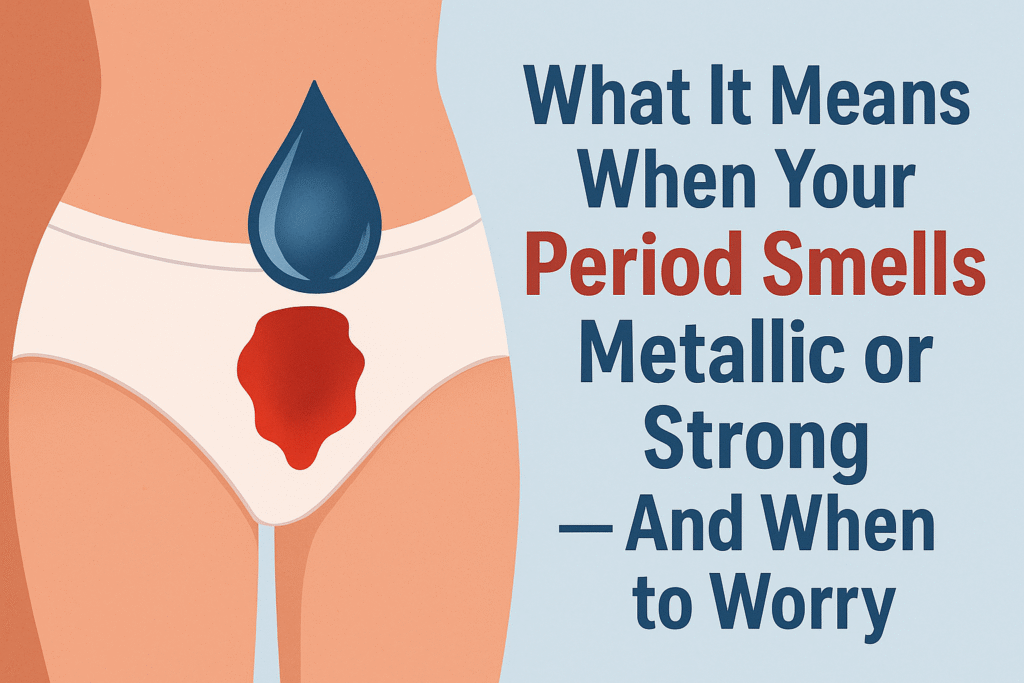
⚠️ Affiliate Disclaimer: This post may contain affiliate links, which means I may earn a small commission — at no extra cost to you — if you make a purchase through one of these links. I only recommend products or services I genuinely trust and believe can provide value. Thank you for supporting My Medical Muse!
7 Reasons Your Period Smells Metallic or Strong And What You Must Know
A metallic scent during menstruation is a common observation for many people and while it can feel alarming, it’s usually linked to completely normal physiological processes. Here’s a detailed look at the main reasons menstrual blood can smell metallic:
1. Iron Content in Blood
Blood contains iron, an essential mineral that plays a crucial role in transporting oxygen throughout the body. Menstrual blood, contains red blood cells rich in hemoglobin, the protein responsible for carrying oxygen, which is bound to iron. When this iron is released during menstruation, it can produce a mild metallic odor. Interestingly, the intensity of the metallic smell can vary depending on your flow:
- Light flows: When the menstrual flow is light, blood tends to stay in the vaginal canal longer. This gives the iron more time to interact with oxygen and other compounds, sometimes intensifying the metallic scent.
- Heavier flows: With a heavier period, blood exits the body more quickly, because it spends less time exposed to oxygen, the metallic smell may be less noticeable.
In most cases, a metallic odor from iron content is completely normal and not a cause for concern.
2. Oxidation of Blood
Another factor that contributes to a metallic or “rusty” smell is the oxidation of blood. Oxidation occurs when blood is exposed to oxygen, causing a chemical change that can darken its color and alter its odor. This is why menstrual blood often turns brown or darker red towards the end of a period and why the scent can become more noticeable at that time. The longer blood remains in the vaginal canal, the more time oxidation has to occur, which can intensify the metallic aroma. This is a natural process and is typically nothing to worry about, although it can be more noticeable if tampons or pads are left in for extended periods.
3. Vaginal pH and Bacteria
The vagina is home to a delicate ecosystem of bacteria, primarily Lactobacillus species, which help maintain an acidic environment with a pH around 3.8-4.5. This acidity is important for preventing the overgrowth of harmful bacteria.
During menstruation, the vaginal pH can shift slightly due to the presence of blood, which is less acidic than normal vaginal secretions. Even subtle changes in pH can influence odor.
- A slightly metallic or stronger smell is often normal as the vaginal environment adapts to the presence of menstrual blood.
- Maintaining proper hygiene without over-washing is essential. Using harsh soaps or over-cleansing can disrupt the natural bacterial balance, potentially leading to stronger odors or irritation. Gentle, unscented washes or simply rinsing with warm water is usually sufficient.
4. Diet and Hydration
Your diet and hydration levels can also influence the smell of your menstrual blood. Certain foods naturally affect body odor, including that of menstrual blood:
- Iron-rich foods: Red meat, spinach, lentils, and other iron-containing foods may subtly enhance the metallic scent because they contribute to the body’s iron levels.
- Hydration: When you’re dehydrated, bodily fluids, including menstrual blood, become more concentrated. This can make odors, including metallic scents, more noticeable.
Maintaining a balanced diet and drinking adequate water daily can help keep menstrual blood odor mild and manageable.
A metallic smell during menstruation is usually a normal part of your cycle. Iron content, oxidation, slight pH shifts, and diet all contribute to this natural scent. In most cases, it’s nothing to worry about, especially if it occurs consistently and is not accompanied by other concerning symptoms like foul odor, itching, or abnormal discharge.
Common Myths About Period Smells
Menstrual odors are often misunderstood, leading to unnecessary worry or embarrassment. Let’s debunk some common myths:
Myth 1: A metallic smell means your period is abnormal.
Truth: Most metallic smells during menstruation are completely normal. This scent usually comes from the iron in blood, which naturally has a metallic aroma. Experiencing this odor does not mean anything is wrong with your cycle.
Myth 2: Periods should never have any smell.
Truth: Mild odors during menstruation are normal. The vagina naturally has a subtle scent that can change slightly throughout the menstrual cycle due to hormonal fluctuations, blood, and vaginal secretions. A faint metallic or slightly musky smell is often nothing to worry about.
Myth 3: Strong smells always indicate infection.
Truth: While foul or unusual odors can sometimes be a sign of infection, not all strong smells are pathological. Menstrual blood that sits in the vagina for a while, or changes in diet, hydration, or hygiene, can also make odors more noticeable. It’s important to consider the context and accompanying symptoms.
When Menstrual Smell Might Indicate a Health Issue
Although mild metallic or musky odors are usually harmless, certain changes in smell can indicate underlying health concerns. Awareness of these signs helps you know when to seek medical advice.
1. Strong, Foul, or Fishy Odor
A distinctly foul, fishy, or rotten smell may suggest bacterial overgrowth, such as bacterial vaginosis (BV). BV occurs when the normal balance of vaginal bacteria is disrupted. Other symptoms may include:
- Grayish-white vaginal discharge
- Itching or irritation
- Burning during urination
BV is common, treatable with antibiotics, and usually not serious if managed promptly.
2. Yeast Infection
Although yeast infections are more common outside menstruation, hormonal changes during your period can trigger symptoms. Typical signs include:
- Thick, white, cottage-cheese-like discharge
- Itching and irritation
- Sweet or yeasty odor rather than metallic
Yeast infections are generally treatable with antifungal medications.
3. Sexually Transmitted Infections (STIs)
Certain STIs can alter vaginal odor and cause abnormal discharge during menstruation. Examples include:
- Chlamydia
- Gonorrhea
- Trichomoniasis, which often produces a strong, unpleasant odor
If you suspect an STI, testing and treatment are essential. Early intervention prevents complications and helps protect sexual partners.
4. Retained Menstrual Products
Leaving tampons or menstrual cups in for too long can create a strong, foul odor due to bacterial growth. To reduce this risk:
- Change tampons every 4-8 hours
- Empty menstrual cups every 8-12 hours
- Wash hands thoroughly before inserting or removing products
Following these guidelines helps maintain vaginal health and prevent infection.
5. Heavy or Irregular Periods
Unusually heavy periods (menorrhagia) or irregular bleeding can make odors more noticeable because blood remains in the vagina longer, allowing oxidation and bacterial activity. Warning signs that require medical attention include:
- Sudden or worsening heavy bleeding
- Clots larger than a quarter
- Fatigue, paleness, or dizziness
If you notice these symptoms, consult a healthcare professional to rule out underlying conditions such as hormonal imbalances, uterine fibroids, or clotting disorders.
Other Factors That Affect Period Smell
Menstrual odor is influenced by many variables beyond infections or medical issues. Understanding these factors helps you maintain hygiene and comfort.
1. Hormonal Fluctuations:
Hormones, especially estrogen and progesterone, influence vaginal secretions and cervical mucus throughout the cycle. These changes can subtly alter odor during menstruation. For example:
- Higher estrogen levels may produce thinner, more watery secretions
- Progesterone dominance can make secretions thicker and slightly stronger-smelling
These fluctuations are natural and usually nothing to worry about.
2. Hygiene Practices:
Maintaining good hygiene helps reduce odor, but over-washing or using harsh soaps can disrupt the vaginal microbiome. Tips for optimal hygiene include:
- Avoid scented soaps, douches, or strong cleansers
- Wash the vulva gently with warm water
- Shower daily during menstruation
- Change underwear and menstrual products regularly
Gentle care preserves the natural bacterial balance, keeping odors mild and preventing irritation.
3. Diet and Lifestyle
What you eat and drink can also affect menstrual odor. Key factors include:
- Foods: Garlic, onions, spices, and other strongly flavored foods may influence vaginal scent.
- Supplements: Iron supplements can enhance a metallic odor, especially during heavy flows.
- Hydration: Dehydration concentrates body fluids, including menstrual blood, making smells more noticeable.
- Alcohol and smoking: Both can subtly alter body odor, including vaginal scent.
A balanced diet, adequate hydration, and a healthy lifestyle can minimize unpleasant odors while supporting overall menstrual health.
Not all strong or unusual menstrual odors are cause for concern. Mild metallic or musky scents are typically normal, but noticeable changes accompanied by discomfort, itching, abnormal discharge, or pain should prompt medical consultation. By understanding the myths, recognizing warning signs, and considering lifestyle factors, you can feel more confident in distinguishing normal menstrual odor from potential health issues.
Tips to Manage Metallic or Strong Period Odors
Even though mild metallic or musky odors during menstruation are normal, there are several ways to minimize stronger smells and feel fresher throughout your period. Implementing a few practical habits can help you stay comfortable and confident.
1. Change Menstrual Products Regularly
Keeping menstrual products clean and fresh is one of the most effective ways to manage odor:
- Tampons: Change every 4-8 hours, depending on flow. Leaving them in too long can increase bacterial growth and create a strong odor.
- Pads: Replace every 4-6 hours or whenever they become saturated. Pads that are too wet can trap bacteria and odor.
- Menstrual cups: Empty and rinse every 8-12 hours. Make sure to clean the cup thoroughly with warm water between uses.
Regularly changing menstrual products reduces bacterial buildup, minimizes oxidation of blood, and keeps smells under control.
2. Maintain Gentle Hygiene
Good hygiene practices can help manage odors without disrupting the vagina’s natural bacterial balance:
- Wash the vulva with warm water. Avoid scented soaps or harsh cleansers, which can irritate the skin and alter vaginal pH.
- Wipe from front to back after using the toilet to prevent introducing harmful bacteria.
- Shower daily during menstruation, and change underwear regularly to keep the area clean and dry.
Maintaining gentle hygiene preserves the natural microbiome and keeps odors mild.
3. Stay Hydrated
Drinking plenty of water has many benefits, including reducing strong menstrual odors:
- Hydration helps dilute bodily fluids, including menstrual blood, making odors less noticeable.
- It also supports overall circulation and detoxification, which can improve vaginal health.
Aim for at least 6-8 glasses of water per day, adjusting for activity level and climate.
4. Diet Considerations
Your diet can subtly influence menstrual odor. A balanced diet supports vaginal health and can minimize unwanted smells:
- Include plenty of fruits, vegetables, whole grains, and lean proteins to promote a healthy vaginal flora.
- Limit foods that can intensify odors, such as garlic, onions, and heavily spiced dishes, if you notice changes during your period.
- Consider probiotics from yogurt or supplements to maintain a healthy bacterial balance.
Good nutrition supports hormonal balance, which also helps regulate the natural changes in vaginal secretions during menstruation.
5. Wear Breathable Clothing
The type of clothing you wear can affect odor and moisture levels:
- Opt for cotton underwear and loose-fitting bottoms to allow airflow and reduce moisture buildup.
- Moisture creates a favorable environment for bacterial growth, which can increase odor.
- Change underwear daily, or more often if you experience heavy flow.
Breathable fabrics help keep the vaginal area dry, fresh, and odor-free.
When to Seek Medical Attention
While most metallic or mild odors are normal, certain signs warrant a professional evaluation:
- Foul, fishy, or rotten smells that are noticeably different from your usual period odor
- Severe itching, burning, or irritation in the vaginal area
- Unusual discharge color, such as green, gray, or bright yellow
- Fever, abdominal pain, or general malaise
- Heavier-than-usual bleeding or large clots
Early consultation can help identify and treat infections, hormonal imbalances, or other underlying issues before they become serious.
A metallic or slightly strong smell during menstruation is usually normal and often linked to the iron content in blood. Mild variations in odor are influenced by:
- Blood flow and oxidation
- Bacterial balance in the vagina
- Hormonal changes during your cycle
- Diet, hydration, and hygiene
However, sudden, strong, or unusual odors, especially if accompanied by itching, pain, abnormal discharge, or other symptoms should prompt a consultation with a healthcare professional.
Remember, menstruation is unique for every person, and your body communicates its health through subtle signals like odor. Paying attention to these signs, practicing safe menstrual hygiene, and maintaining a balanced lifestyle can help you distinguish normal variations from issues that require medical attention.
FAQs About Period Odor
Q: Is it normal for my period to smell metallic every month?
- Yes. A metallic smell is often due to the iron in blood and is considered a normal part of menstruation.
Q: Can diet affect period smell?
- Yes. Foods such as red meat, garlic, onions, and spices can influence menstrual odor. Staying hydrated and eating a balanced diet can help reduce strong smells.
Q: When should I worry about period odor?
- Seek medical advice if the odor is foul, fishy, or accompanied by pain, unusual discharge, irritation, or other concerning symptoms.
Q: Do tampons cause metallic smells?
- Not directly. However, leaving tampons in for too long can create a strong, unpleasant odor due to bacterial growth. Regular changing helps prevent this.
Q: Can lifestyle habits influence menstrual odor?
- Yes. Smoking, alcohol consumption, poor hydration, and certain medications can subtly affect vaginal odor. Maintaining a healthy lifestyle supports overall menstrual and vaginal health.
👩⚕️ Need Personalized Health Advice?
Get expert guidance tailored to your unique health concerns through MuseCare Consult. Our licensed doctors are here to help you understand your symptoms, medications, and lab results—confidentially and affordably.
👉 Book a MuseCare Consult NowRelated Blog Post You Might Like:
- Why Your Period Blood turns Brown at the End: 7 Fascinating Reasons and When to Worry
- 10 Powerful Reasons Why Your Hands Swell During Your Period And How to Fix It Fast
- 7 Surprising Reasons Why You Have Mucus in Period Blood and Why It’s Usually a Good Sign
- 8 Surprising Reasons Why Your Period Blood Looks Watery and Why It’s Usually Nothing to Worry About
- 10 Surprising Reasons Why Your Period Suddenly Became Shorter This Month and Why It’s Not Always Bad
- 10 Powerful Reasons Why You Get Dizzy Right Before Your Period
Dr. Ijasusi Bamidele, MBBS (Binzhou Medical University, China), is a medical doctor with 5 years of clinical experience and founder of MyMedicalMuse.com, a subsidiary of Delimann Limited. As a health content writer for audiences in the USA, Canada, and Europe, Dr. Ijasusi helps readers understand complex health conditions, recognize why they have certain symptoms, and apply practical lifestyle modifications to improve well-being


